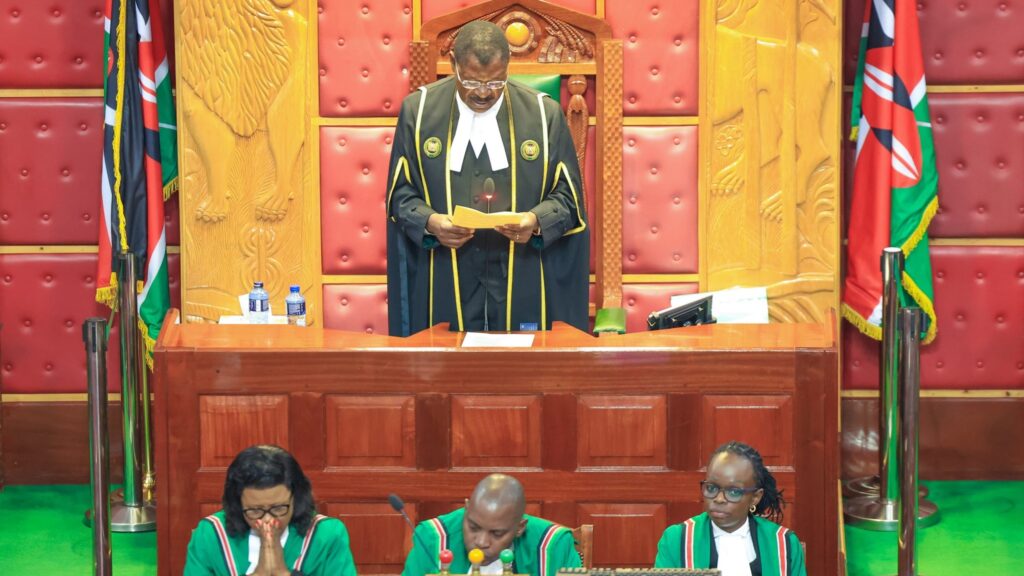
Fresh Standoff as National Assembly Rejects Senate Push for Higher County Allocation » Capital News
NAIROBI, Kenya, June 3 – A fresh standoff has erupted between the National Assembly and the Senate over the equitable share of revenue to counties, after the National Assembly rejected Senate-proposed amendments to the Division of Revenue Bill, 2025.
The Senate had amended the Bill to raise the allocation to counties by Ksh 60 billion—from Ksh 405 billion as earlier approved by the National Assembly, to Sh465 billion. The move now triggers a mediation process between the two Houses, a procedure that is often protracted.
Senate Finance and Budget Committee Vice Chairperson Tabitha Mutinda defended the proposed increase, saying it was informed by the burden of non-discretionary expenditures amounting to Ksh 34 billion, imposed on counties by national government directives. These include Sh4.1 billion for the Housing Levy, Sh6 billion for National Social Security Fund (NSSF) contributions, Ksh 11.8 billion for County Aggregated Industrial Parks, and Ksh 3.23 billion for community health promoter payments.
Other obligations include Sh6.3 billion for annual wage increments under the Integrated Payroll and Personnel Database (IPPD), and Sh3.5 billion for doctors’ salary increases under the 2017 Collective Bargaining Agreement and return-to-work pacts.
However, the National Assembly dismissed the proposed increase, citing fiscal constraints. Majority Leader Kimani Ichung’wah, while moving the motion to reject the amendments, warned that raising county allocations beyond what was already approved would be fiscally irresponsible.
“The Bill as approved by this House had Sh405 billion. The other House amended it to Sh465 billion—an increase of Sh60 billion,” said Ichung’wah. “Given our current fiscal space, it is not practical to make such an increment. It is only fair that we reject this amendment and move to early mediation.”
Bumula MP Jack Wamboka seconded the motion, arguing that the country’s economic situation does not allow for such a substantial increase. “I beg to second, bearing in mind the fiscal space the country is operating in. It is only abnormal for anyone to think we should be increasing these monies upwards,” he said.
The National Assembly’s move activates the mediation process under Article 113 of the Constitution. A joint committee comprising members from both Houses will now be formed to negotiate and agree on the final equitable share for counties in the 2025/2026 financial year.
The Senate has insisted that counties are struggling to deliver basic services amid rising costs, delayed disbursements, and ballooning wage bills. Senators voted to push the National Treasury to disburse Sh460 billion to counties to support devolved functions, which they say are under strain due to inadequate funding.
Senate Majority Leader Aaron Cheruiyot expressed concern over the financial sustainability of county governments, pointing out that 34 out of 47 counties spend more than 50 per cent of their shareable revenue on recurrent expenses. “It makes no sense to fight for Sh400 billion or Sh450 billion for counties when 90 per cent of that money is misappropriated,” said Cheruiyot. “Why should we send that much if over half of it is used to pay 300,000 to 400,000 people, excluding millions of others?”
In a dispatch accompanying the Bill, National Assembly Speaker Moses Wetang’ula defended the Sh405 billion figure, noting it included a Sh17.6 billion increase from the previous financial year. He said the allocation was based on current revenue performance and aligned with the government’s fiscal consolidation strategy aimed at reducing the deficit to 4.3 per cent of GDP.
“This is intended to slow the accumulation of public debt, improve the primary surplus, and enhance fiscal sustainability,” said Wetang’ula.
Senate Chief Whip Boni Khalwale supported the higher allocation, arguing that the Sh465 billion for counties and Sh2.231 trillion for the national government was equitable. “The national government must ensure equity across all eight regions,” he said. “We are tired of seeing one region 100 years ahead of another simply because no one from that region has become President or Prime Minister.”
“All 290 sub-counties and 47 counties must develop at the same pace. President William Ruto and his Cabinet must hear the people of Western Kenya clearly—we campaigned for him, we support him, and we want to succeed, so the country can succeed,” Khalwale added.
The National Treasury has consistently warned that the government is operating under tight fiscal constraints, grappling with a growing public debt burden, limited revenue collection, and pressure to fund key national priorities.